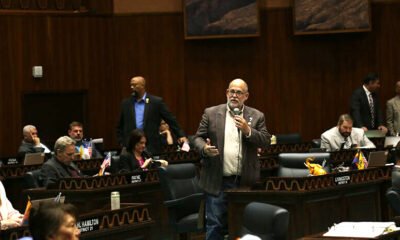Business
Arizona’s Abortion Ban Overturned: A Permanent Victory for Reproductive Rights

A Maricopa County Superior Court judge has ruled that doctors and patients in Arizona will now have the final say on abortion timing, effectively nullifying the state’s 15-week abortion ban. This decision follows a significant voter initiative last year that established abortion rights in the Arizona Constitution.
The lawsuit that led to this ruling was brought forth by two OB-GYNs and the Arizona chapter of Planned Parenthood. They contended that the 2022 law, which restricted abortions after 15 weeks except in dire circumstances, contradicted the fundamental rights established by Proposition 139, passed overwhelmingly by voters in November.
Judge Frank Moskowitz’s two-page ruling declared the 15-week ban void, stating that it could not be enforced and eliminated the associated penalties that threatened doctors with two years of prison for violations. His order explicitly prohibits the state and its agents from enforcing the now-defunct law.
The 15-week restriction clashed with Proposition 139, which allows abortions until fetal viability, typically recognized at approximately 23 to 24 weeks, and permits procedures beyond that for the health and safety of the patient.
Advocates for abortion rights hailed the ruling as a pivotal victory against Arizona’s restrictive abortion laws. While celebrating this progress, they noted that many challenging laws remain, including those imposing a 24-hour waiting period and prohibiting the use of telehealth for prescribing abortion medication. These outdated regulations will require further legal scrutiny.
Dr. Paul Isaacson, an OB-GYN involved in the lawsuit, expressed relief following the ruling. He highlighted the importance of providing patients with essential healthcare without the fear of criminal repercussions. “For nearly three years, my hands were tied because of this cruel ban,” he stated. “It is a relief to no longer have to turn away patients from essential health care.”
Dr. Eric Reuss, the lead plaintiff, emphasized that the court’s decision rightly places patient care above political interference. He remarked on the negative impact of the ban on his patients and stressed the importance of timely access to healthcare.
Prior to this ruling, Arizona faced a near-total abortion ban dating back to 1864 and endured the struggle of the 15-week limit for nearly three years. This environment halted many clinics, forcing them to limit services and often close their doors. The legal battle intensified as abortion rights groups sought to protect reproductive health access.
Following the passing of Proposition 139 and an agreement to suspend the 15-week ban during legal proceedings, many healthcare providers resumed offering services beyond the gestational limit.
Dr. Misha Pangasa from Planned Parenthood Arizona welcomed the ruling as a triumph for voters and for patient autonomy. She affirmed her organization’s commitment to delivering care without the risk of government interference, stating, “This is a huge moment for Arizonans who voted to enshrine abortion access.”
Arizona Attorney General Kris Mayes, a prominent advocate for abortion rights, underscored the importance of the judge’s ruling. In a statement, she remarked, “The ruling reaffirms what Arizonans made clear when they passed Prop 139: the right to make personal medical decisions belongs to individuals, not politicians.”

















